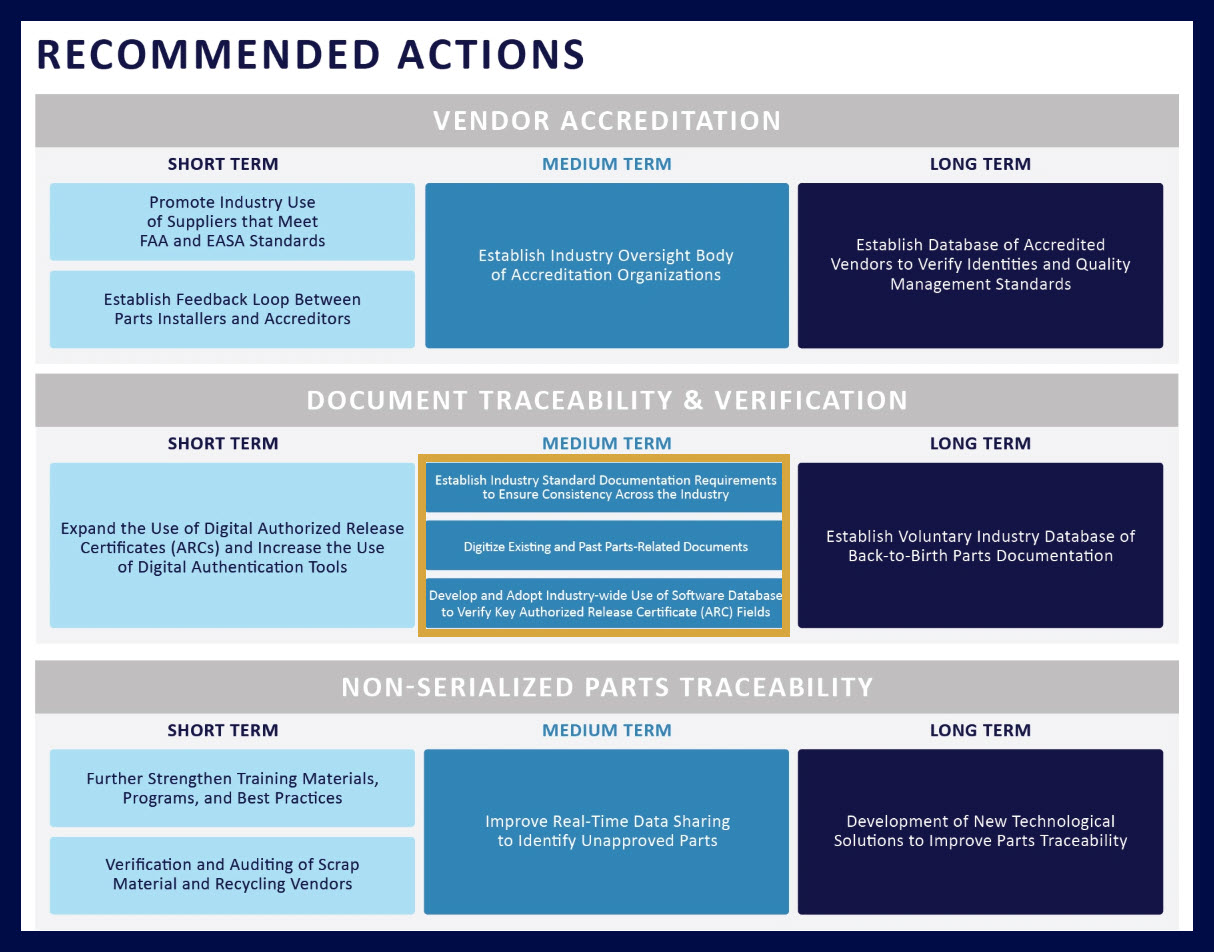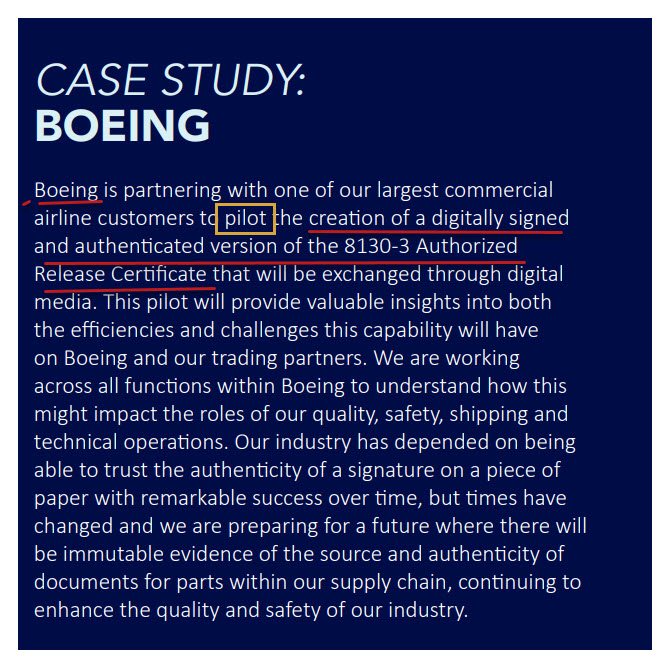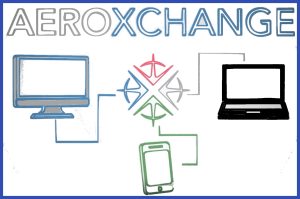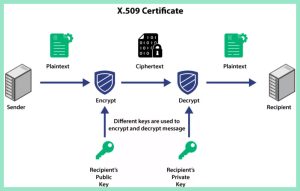ASCIC’s SUP fix- Boeing/Aeroxchange/Southwest DOES
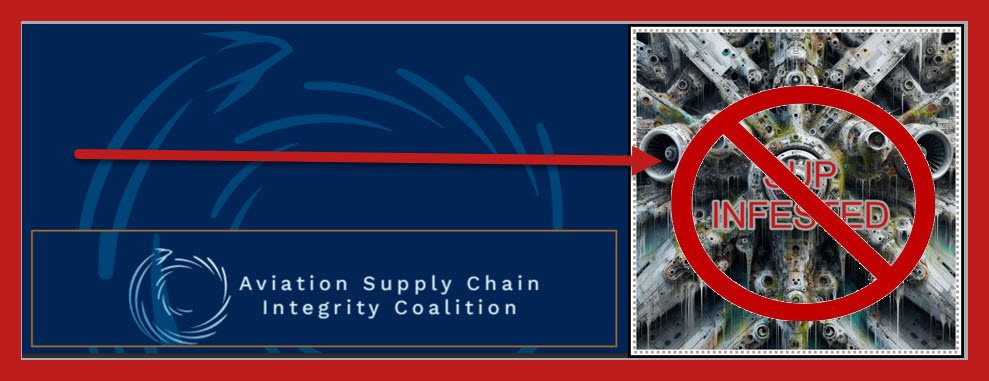
In a significant press release, BOEING AND ITS PARTNERS SOUTHWEST AND AEROXCHANGE announced that they have successfully launched a digital FAA Form 8130-3 Certificate!!! Suspected Unapproved Parts have been the scourge of the global aviation community that relies on authentic replacement parts to assure the airworthiness of their fleets.
A brief summary of the past problems and posited solutions:
- Third Party Part Supplier sells SUP CFM-56 parts into air carrier inventory-WHAT NEEDS BE DONE
- WHAT TO DO? GLOBAL AVIATION SUPPLY CHAIN ATTACKED
- UK Criminal Investigation and Russian plane inventory= need for greater unairworthiness detection skills
- Invidious SUPs just got harder to detect-what to do?
The industry took action by forming a coalition:
In February 2024, aerospace industry leaders from around the world formed the Aviation Supply Chain Integrity Coalition (“the Coalition”) to recommend actions the industry can take to prevent unapproved propulsion parts from entering the supply chain again and to strengthen the overall integrity and safety of the supply chain. Former National Transportation Safety Board (NTSB) Chairman Robert Sumwalt.
The Coalition’s Report focused on the need for more secure documentation and explained:
More explicitly–
“In the Coalition’s view, there are several methods that can be employed to utilize technology to improve traceability, and ensure authenticity of documentation, as the Coalition heard from SMEs across the industry, including:
▪ Expanding the use of digital Authorized Release Certificates (ARCs) and increasing the use of other digital tools to enhance document authentication;
▪ Establishing industry standard documentation requirements to ensure consistency across the industry;
▪ Promoting the digitization of existing and past parts-related documents;
▪ Developing and adopting an industry-wide use of a software database to verify key Authorized Release Certificate (ARC) fields;
and
▪ Establishing a voluntary industry database of Back-to-Birth parts documentation with non-competitive data
Elsewhere in its report, the Coalition announced that Boeing, Southwest Airlines and Aeroxchange have done—
Below is an announcement, as predicted (sort of), that a digitized FAA Form 8130-3A has been successfully implemented by Boeing, Southwest and Aeroxchange. Good Direction ASCIC and great delivery by the team,
Boeing, Airline Partners Set New Standard for Parts Authentication
October 13, 2025
PLANO, Texas, Oct. 13, 2025 /PRNewswire/ — BOEING [NYSE: BA], in partnership with SOUTHWEST AIRLINES (SWA) and AEROXCHANGE LTD[1]., has successfully completed the aerospace industry’s FIRST PARTS SHIPMENT ACCOMPANIED BY A DIGITAL 8130-3 CERTIFICATE—an electronic version of the FAA-governed 8130-3 Authorized Release Certificate. This milestone advances supply chain security by preventing unapproved spare parts from entering the aerospace aftermarket.
“This industry-first shipment reflects Boeing’s dedication to pursuing game-changing solutions through teamwork and partnership,” said William Ampofo, senior vice president, Parts & Distribution and Supply Chain, Boeing Global Services. “Together with Southwest Airlines and Aeroxchange, we are transforming how the industry ensures part authenticity and supply chain security.”
The FAA Form 8130-3 certifies the airworthiness of aircraft parts, components and articles. The digital 8130 certificate replaces the traditional paper certificate with a secure, encrypted file that authenticates the authorized signer’s identity and ensures document integrity. Boeing led a pilot project to generate and gain authorization for this digital solution.
Recently, a battery serviced at Boeing’s product repair services center in Davie, Florida, was the first part shipped using the electronic form, transmitted using the AEROXCHANGE EARC™ platform. Southwest Airlines received the battery at its Dallas facility, verifying its authenticity and airworthiness through the new digital process.
“Southwest is proud to be a partner in the electronic process of document transfers and thrilled to be onsite for the very first delivery of a ship battery using this process. The security benefit of electronic forms aligns to Southwest’s value of a Safety-first culture and will be of significant benefit in the aviation industry,” said Landon Nitschke, senior vice president, Technical Operations, Southwest Airlines.
“Aeroxchange is honored to have partnered with Boeing and Southwest Airlines to transmit this first ever eARC document providing a highly secure, verifiable digital record of the Authorized Release Certificate, Form 8130-3,” said Al Koszarek, president and CEO of Aeroxchange. “This landmark event is a milestone on the industry’s journey to prevent unapproved parts from entering the aviation supply chain.”
Leveraging industry-leading X.509 security protocols[2], public/private key encryption, and blockchain-ready formats, the digital 8130 certificate creates an immutable, verifiable record of part authenticity throughout its lifecycle.
Boeing will continue rolling out use of the digital 8130 certificate across all nine of its product repair services centers, as each center receives authorization from the FAA to use electronic systems for recordkeeping, electronic signatures and electronic manuals.
Expanding the use of digital authorized release certificates was a key recommendation from the Aviation Supply Chain Integrity Coalition (ASCIC), a cross-industry group dedicated to preventing unapproved parts from entering the aviation supply chain. Boeing, Southwest Airlines and Aeroxchange are active members of the ASCIC.
A leading global aerospace company and top U.S. exporter, Boeing develops, manufactures and services commercial airplanes, defense products and space systems for customers in more than 150 countries. Our U.S. and global workforce and supplier base drive innovation, economic opportunity, sustainability and community impact. Boeing is committed to fostering a culture based on our core values of safety, quality and integrity.
[1] Aeroxchange is a legacy service that was created by a consortium of airlines in 2000. Like ePlane, it supports the full order lifecycle, not just RFQs/Quotes. This is one of the more complex systems, as it requires a lot of setup and integration.
[2] X.509 security protocols are essential for establishing trust and secure communication in the digital realm. They are widely used in various applications, including:
Secure Email Communication (S/MIME): X.509 certificates are critical in securing email communications through the S/MIME protocol, providing encryption and digital signatures. Code and Document Signing: Software developers and document issuers rely on X.509 certificates to authenticate their work, ensuring the authenticity and integrity of their creations. Network Authentication: X.509 certificates automate network and device access, securing online customer transactions, and enforcing digital signatures. Zero Trust Strategies: X.509 certificates are used in Zero Trust strategies like single sign-on (SSO) or multi-factor authentication (MFA).
